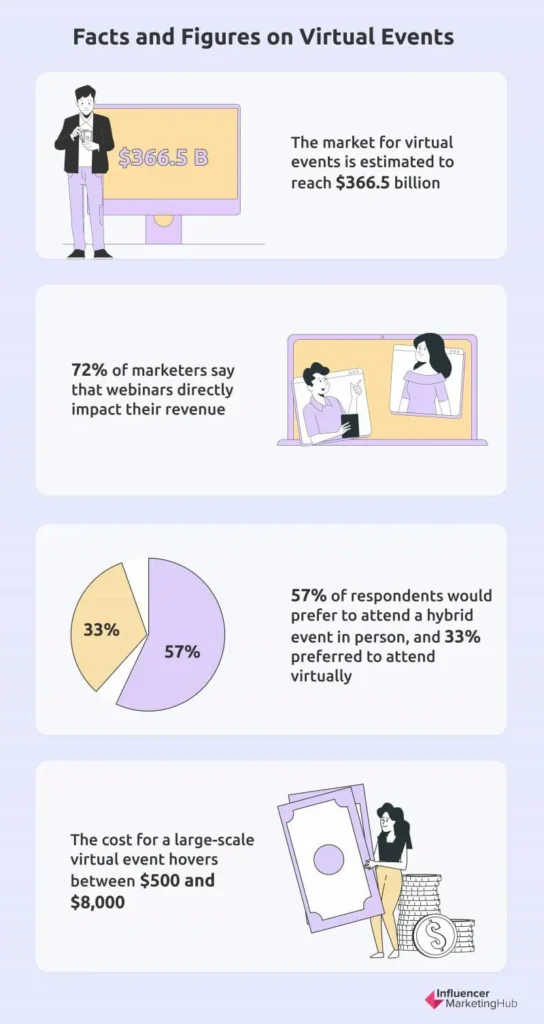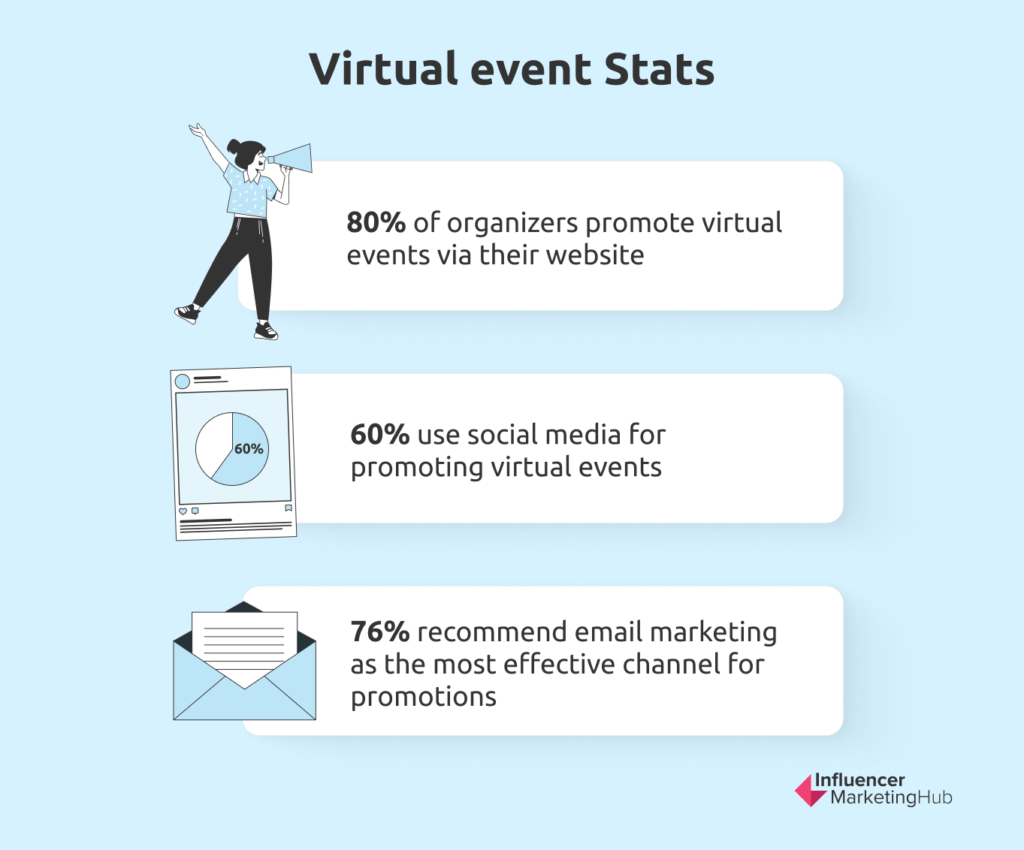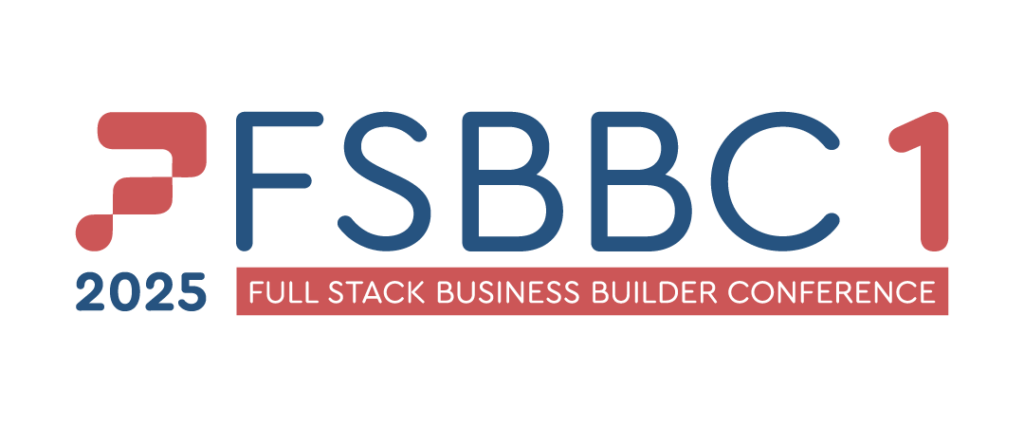
- The market for virtual events is estimated to reach $366.5 billion by 2027.
In 2021, the global virtual events market was valued at $114 billion, and experts estimate that it will grow to approximately $366 billion by 2027. One major factor in its growth is the prevalence of Internet usage globally. With the Internet, more people around the world are able to connect and work with each other remotely. This naturally leads to an increased demand for online meetings and conferences to be able to work efficiently.
- Webinars are the most popular form of virtual events.
Webinars topped Statista’s poll of the most favorite digital activity in 2020. The ON24 Webinar Benchmarks Report 2021 reveals that 72% of marketers say that webinars directly impact their revenue and pipeline. Meanwhile, 99% of respondents from the small business and enterprise sector in a Statista survey say that webinars are a significant part of their marketing strategy. Webinars provide solid leads, much more than other channels, according to 89% of the respondents. In addition, 78% reported that webinars lower their cost per lead.
- On-demand content is increasing in popularity.
Meanwhile, convenience seems to be the leading factor in the prevalence of webinars among participants, as on-demand content from these events is becoming more popular. Live webinars are still widely used, though the trend shows a decrease in attendance at live events while on-demand viewing has been increasing.
- More people prefer to be physically present than be online during hybrid events.
A 2021 Statista survey indicated that 57% of respondents would prefer to attend a hybrid event in person, and 33% preferred to attend virtually. Though the majority of the respondents were inclined to attend physically, the numbers show that it is not an overwhelming majority, with a third of the respondents still partial to virtual attendance.
- On average, the cost for a large-scale virtual event hovers between $500 and $8,000.
The most expensive cost for companies is the platform, which provides all the technology required to successfully host a large virtual event. The second most expensive cost is the speakers and moderators. But even if it can be a bit costly, it is still less expensive than an in-person event and more cost-effective. Organizers wouldn’t need to book a venue, transportation, lodging, and catering for everyone. However, we’ll need to ensure that the platform they use can handle all the requirements to make the event as smooth as possible and prevent video fatigue among the attendees during the event.
License fees for video conferencing tools and platforms are usually priced on a monthly or annual subscription. Small events can cost you approximately $50 a month, while bigger events can set you back as much as $8,000 or more a month. Some companies charge add-ons for premium services, such as branding and sponsorship booths, while others have most features built-in at a fixed monthly rate. They can also charge you per registrant depending on their pricing model.
Other costs that we have to consider when organizing a virtual event include:
- Virtual event venues
- Virtual conference kits, gifts, or giveaways
- Landing page for the event
- Video editing for pre-recorded sessions
- Technical support
- Staff training
- Branded backdrops or green screens
- Dry runs or rehearsals
- Security
- Post-event editing (for on-demand viewing after the event)
- In-depth analytics
- Promoting a virtual event takes several weeks and different channels to drive registrations.
Most event organizers need 3 to 6 weeks to promote small virtual events, according to Markletic. Bigger events need more time, typically more than 6 weeks, to successfully reach the target number of registrants. And because the event is virtual, promotional channels are also largely confined online.
Markletic also reports that 80% of organizers promote virtual events via their website, and 60% use social media. Meanwhile, 76% recommend email marketing as the most effective channel for promotions.
B2B companies do it a little differently, as their main audience is not the general public. For their virtual events, they usually rely on their business partners to attract participants.
- Around 74% of organizers report seeing a positive ROI six months after the event.
Even with a non-attendance rate of 35%—a figure somewhat higher than for in-person events—virtual events produce a positive ROI. To boost revenue from these types of events, organizers also accept sponsorships for individual sessions or for the entire function.
- People are still inclined to attend virtual events even after the lockdown period.
While opinions vary depending on the country, people are still willing to attend virtual events after 2023 lockdown dropped. European countries and Australia tend to favor in-person events. In the United Kingdom, for example, only 39% of respondents will do both video conferencing and in-person meetings, while 56% prefer to meet in person only. On the other hand, Asian and American countries are more flexible. 52% percent of US respondents report that they will attend both virtual and in-person events; in Japan, the number is higher at 65%. Across the world, however, the percentage of people who plan to attend only virtual events after the health crisis is low, typically below 10%.
These numbers imply that hybrid events will most likely be the norm for the foreseeable future.

The Future of Virtual Events
As we’ve seen from the statistics, it looks like virtual events—whether fully online or hybrid—are here to stay. The convenience afforded by virtual events makes it difficult for a world connected by the Internet to let go of this technology.
The technology for hybrid events is also evolving rapidly, so we can expect to have a better experience with virtual events. One example would be the use of virtual reality to give online attendees a more realistic and immersive experience. The VR/AR industry is growing, so it would not be far-fetched to assume that we can expect to see VR/AR components at hybrid events for virtual guests within the next few years.
Even if more and more people are able to attend events physically, data shows that there is still a sizeable chunk of the population who would prefer to attend online, and this is where the Full Stack Business Builder Conference sits.
Exciting times are ahead in the global virtual events market. It’s time for us to embrace these advancements in technology and look forward to a more digital future. We here at the Full Stack Business Builder Conference are leading the fully-digital conference experience. We are base level 0.
Will we be the next evolution of TEDx? – I think so. Join us.
All the best,
FSBB Team


